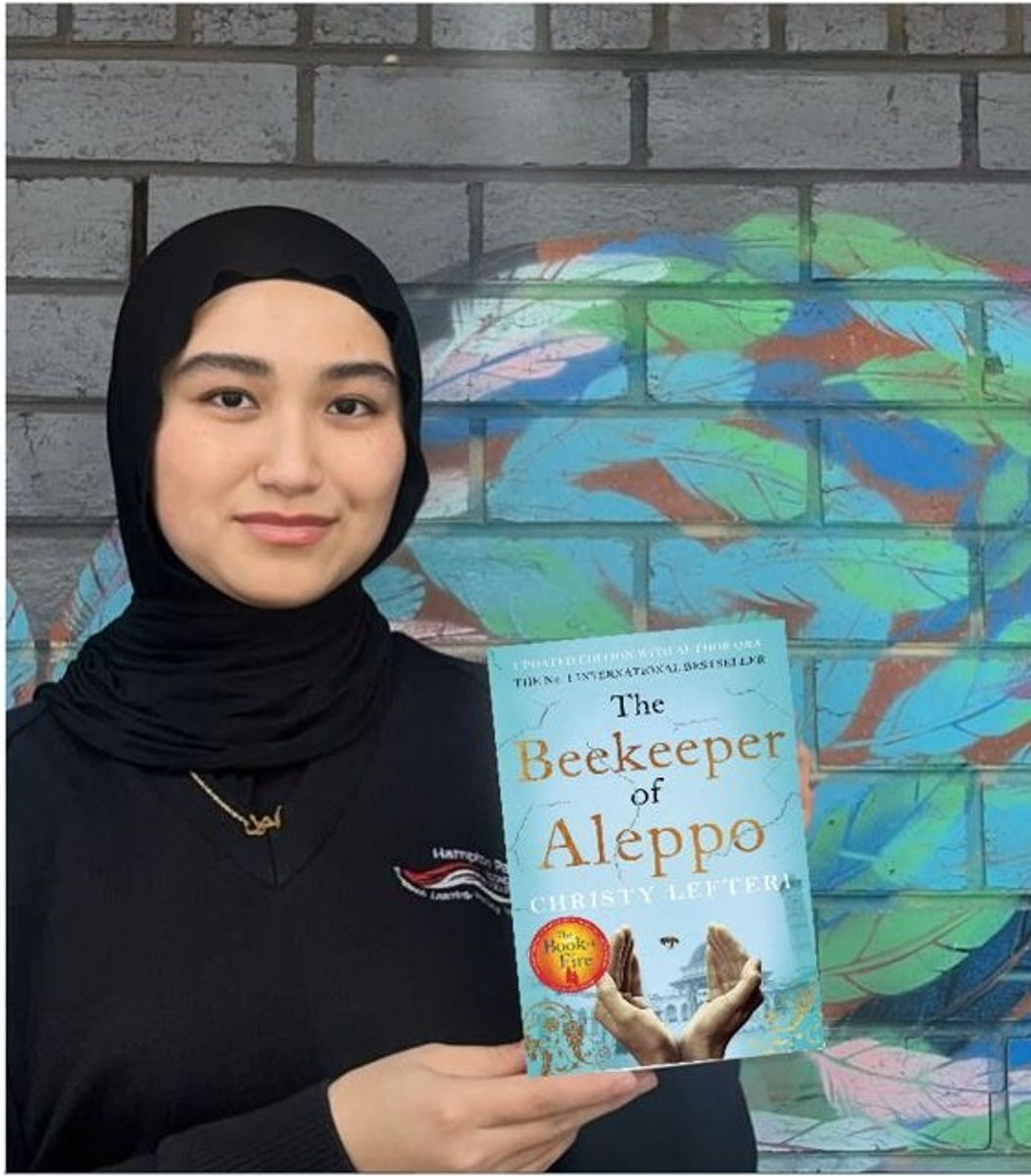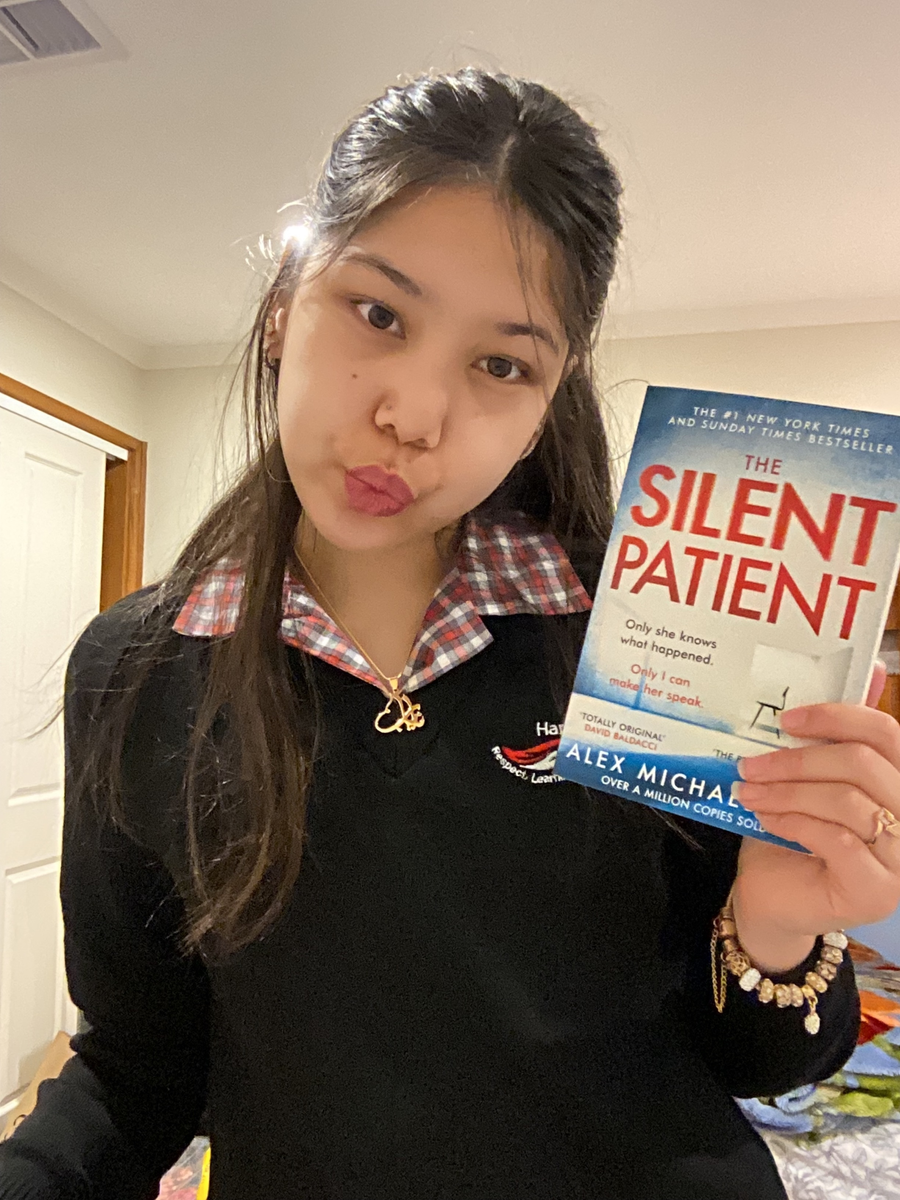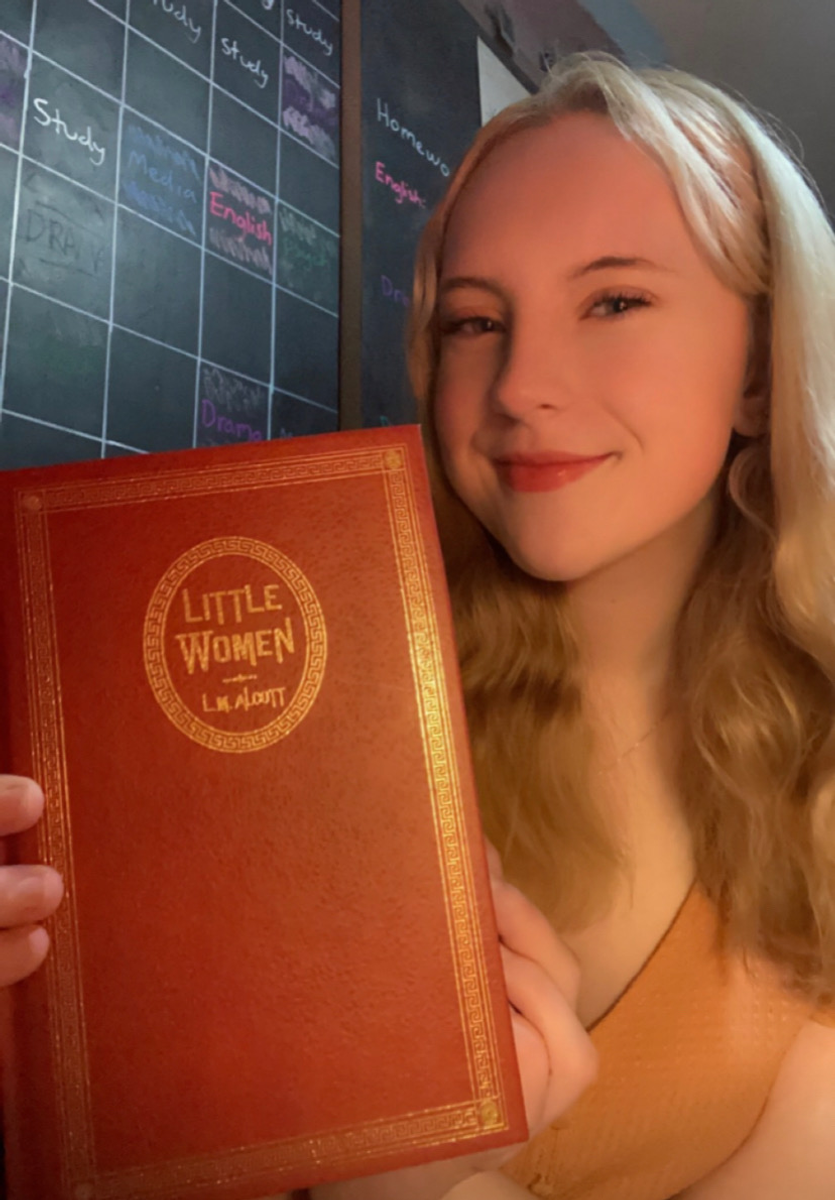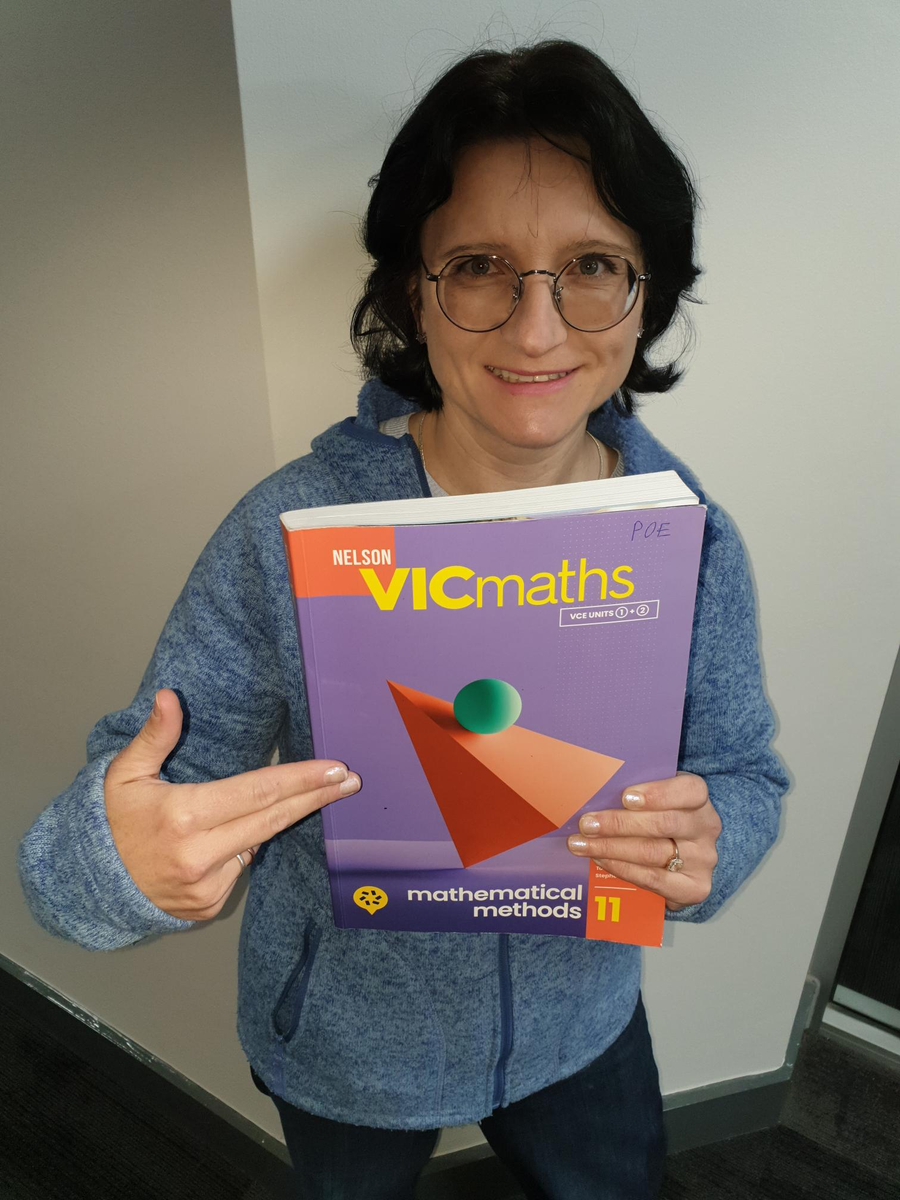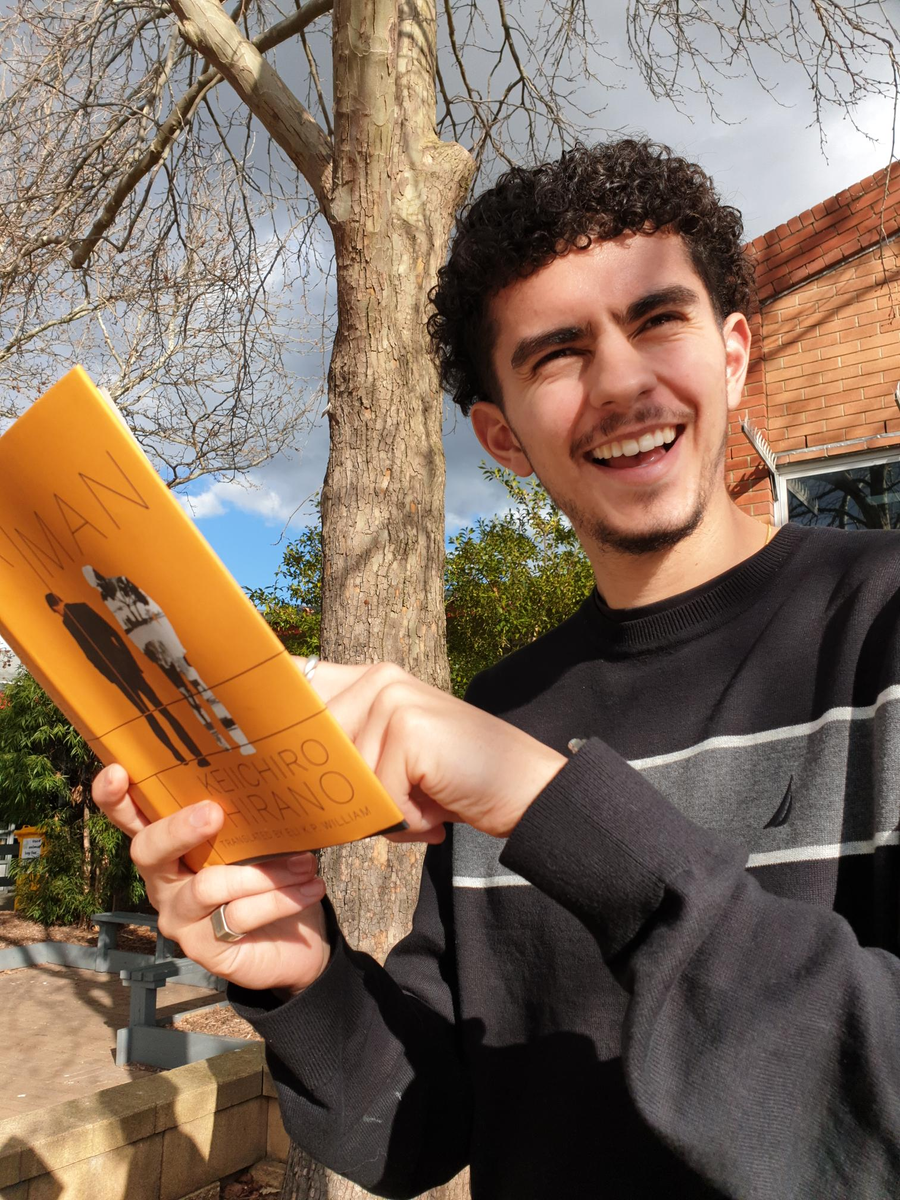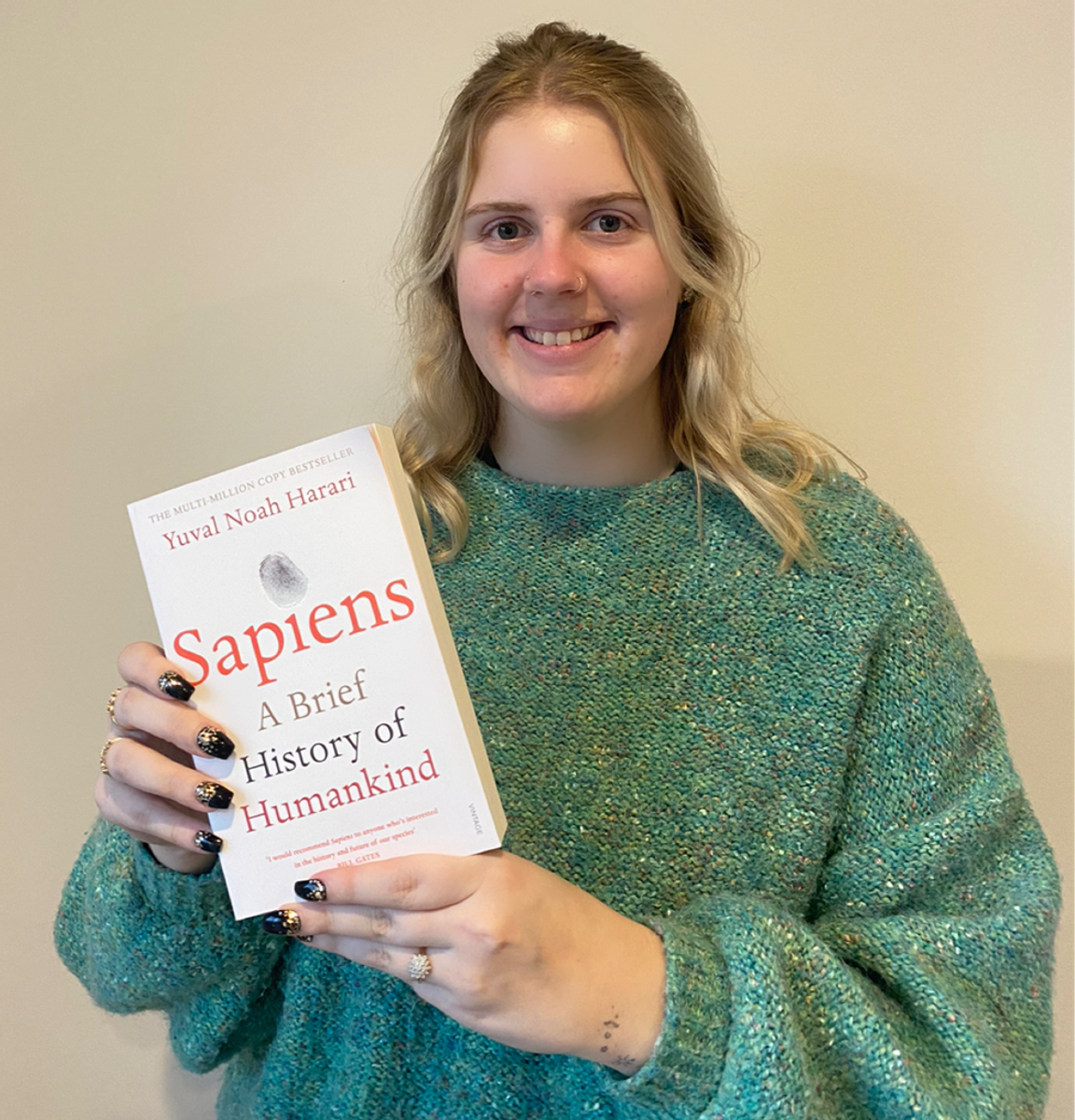Book Reviews
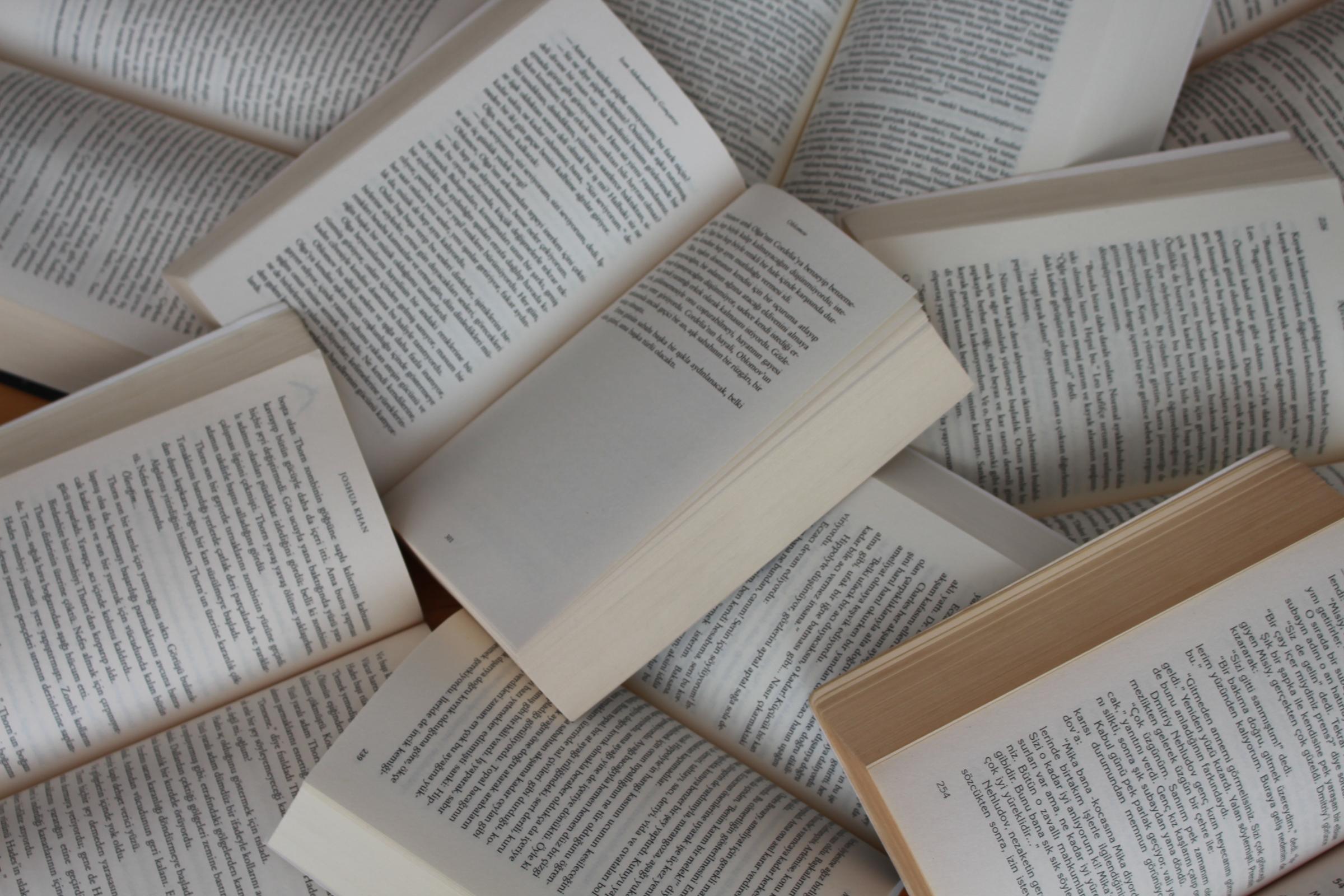
Book Review by Batool Khan
‘The Beekeeper of Aleppo’ by Christy Lefteri
The Beekeeper of Aleppo by Christy Lefteri is an engaging and soul-stirring novel that tells the story of Nuri and Afra, a Syrian couple forced to flee their war-torn homeland. As a student, it’s a deeply touching story that vividly captures the harrowing journey of refugees fleeing the devastation of war in Syria. The book offers a deeply personal and empathetic exploration of the refugee experience.
First off, let me just say that this book is a real page-turner! Lefteri’s writing style is incredibly captivating, and she does a fantastic job of immersing readers into the world of Nuri and Afra. The vivid descriptions of Aleppo and the beekeeping profession are so detailed that it feels like you’re right there with the characters. Personally, it made me want to be a beekeeper at one stage!
One night, late in the summer, vandals destroyed the hives. They set fire to them, and by the time we got to the apiaries in the morning they were burned to char. The bees had died and the field was black. I will never forget the silence, that deep, never-ending silence. Without the clouds of bees above the field, we were faced with a stillness of light and sky. In that moment, as I stood at the edge of the field where the sun was slanting across the ruined hives, I had a feeling of emptiness, a quiet nothingness that entered me every time I inhaled.
What really struck me about this book is how it shines a light on the refugee experience. It’s a topic that we often hear about in the news, but The Beekeeper of Aleppo gives us a deeply personal and intimate look into the lives of those affected by war and displacement. The struggles, hardships, and resilience of Nuri and Afra are portrayed in such a raw and honest way that it truly tugs at your heartstrings.
One thing to note is that the pacing of the book can be a bit slow at times. It’s not a fast-paced thriller but a more introspective and reflective read. Personally, I didn’t mind the slower pace because it allowed me to really delve into the emotions and thoughts of the characters. However, this might not be your cup of tea if you prefer books with a faster tempo. Another aspect of the book that might take some getting used to is the nonlinear structure. The story jumps back and forth between past and present, which can sometimes be a bit confusing. However, once you get the hang of it, it adds another layer of depth to the narrative and helps to reveal more about the characters’ backgrounds and motivations.
In conclusion, The Beekeeper of Aleppo is a thought-provoking and beautifully written novel that sheds light on the refugee experience in a way that brings you back to life. It’s a story of love, loss, and the power of hope in the face of adversity. I highly recommend this book to everyone who enjoys emotionally impactful stories as this book has left a lasting impact on me and I believe it will do the same for YOU.
Book Review by Nayab Nawrozi
‘The Silent Patient’ by Micheal Michaelides
The Silent Patient is a shocking psychological thriller about a woman's act of violence against her husband--and of the therapist obsessed with uncovering her motive.
“I didn't kill Gabriel. Gabriel killed me. All I did was pull the trigger.”― Alex Michaelides, The Silent Patient
Alicia Berenson lived a seemingly perfect life until one day six years ago. When she shot her husband in the head five times. Since then, she hasn't spoken a single word. It's time to find out why.
The book starts off by introducing us to Alicia. Alicia Berenson’s life is picture-perfect. She has her dream job as a painter, an attractive husband who adores her, even though his job is shooting semi-naked women. On a typical summer night, Alicia shoots her husband five times. She never spoke after that, and the police thought it was some sort of femme fatale movement. Alicia is transferred to the Grove psychiatric institution after being charged and convicted of the crime. Despite their greatest attempts, no one can persuade her to say anything. Until Theo Faber, a criminal psychotherapist is captivated with Alicia's narrative. The Grove is losing money and is set to close within a year, but Theo accepts a job there to have access to Alicia.
Theo Faber is a psychotherapist. His determination to get her to talk and unravel the mystery of why she shot her husband takes him down a twisting path. He reads Alicia’s diary which discuss her self-harming and childhood trauma of her mother committing suicide to providing Alicia with painting sessions to help her and she paints two people escaping from a fire at the Grove to even visiting her childhood home. Theo meets Paul (Alicia’s cousin), who admits asking Alicia for money but says she refused to give it to him. He also reveals that he and Alicia liked to sit on the roof of the house. There, Alicia overheard her father saying he wished Alicia had died in the accident instead of her mother.
Theo meets with Alicia and tells her he knows what her father said. He says their therapy will be terminated unless she cooperates. Alicia finally speaks, saying “okay.” Their next session, Alicia talks more. She and Theo walk in the courtyard, smoking, and she tells her story although Theo believes it is false.
During this whole investigation, Theo discovers his wife Kathy is cheating on him. He follows her to a park where he witnesses her doing the deed with him. He continues to follow his wife and each time his anger builds up wanting to murder him, until one day he follows him to his house…
Who is he?
Is Theo going to kill him?
Why is this relevant to the story?
The Silent Patient is an addictive psychological thriller novel. This book took me two days to finish because I was so interested. The plot twist was very unexpected and made the book 10x better. Seriously go read this, buy it, make a cup of coffee, lock yourself up in a room, and enjoy reading this masterpiece.
Book Review by Loren Sumner
‘Little Women’ by Louisa May-Alcott
Little Women by Louisa May Alcott is definitely one of my all-time favourite books! Originally published in 1868, Little Women is an incredible proto-feminist novel that follows the lives of the four March sisters - Meg, Jo, Beth, and Amy – as they navigate the ups and downs of adolescence, life, and womanhood.
Admittedly, in year 12 I have very little time for recreational reading, but the story of Little Woman is one that forever has been and forever will be in my heart. I first read the book when preparing to perform in a play of the story, where I acted as Jo, the second eldest daughter who has an affinity for writing and, unlike most women at the time, a disinterest in marriage.
Reading classic literature can be difficult and daunting, but I would say if you read any classic novel, give this one a try! Alcott’s writing style is beautifully descriptive and evocative, while still being simple to read. My favourite part of Alcott’s writing would have to be how she details each of the four March sisters and their distinct personalities, making them relatable even almost two centuries later. Through these incredibly three-dimensional characters, Alcott demonstrates how women can strive for vastly different lives, but each is just as important as the next, no matter what they may look like.
Meg, the eldest, is responsible and nurturing, dreaming of starting her own family with a man she loves. Whereas Jo is fiercely independent and cares the most for her writing. Beth is gentle and kind-hearted, showing love through her piano skills. And finally, Amy, the youngest, is wild and charming and expresses herself through art as she wishes to become an artist and go to Rome.
“I want to do something splendid...something heroic or wonderful that won't be forgotten after I'm dead. I don't know what, but I'm on the watch for it and mean to astonish you all someday.”
All four sisters possess such distinct personalities; I promise you will relate to at least one! (I personally relate to Jo and Amy a lot). Alcott does an incredible job of showcasing the complexities of sisterhood throughout the novel, through themes of family, friendship, and love (in all forms). The character development is truly something I admire in this story, as the girls grow up and mature, navigating through the challenges of transitioning from childhood to adulthood, societal expectations, personal desires, and loss of loved ones.
“Beauty, youth, good fortune, even love itself, cannot keep care and pain, loss and sorrow, from the most blessed for...into each life some rain must fall, some days must be dark and sad and dreary.”
Alcott’s portrayal of the period is vivid and historically accurate, providing readers with a glimpse into the social norms and expectations of the era, as the novel touches upon important social issues such as gender roles, poverty, and the impact of war. Despite this, however, Little Women is truly a timeless story that can resonate with readers of any age. Even if you’re not a big reader, I highly recommend checking out the story of Little Women through one of the many adaptations – the 2019 film by Greta Gerwig (SAME DIRECTOR AS BARBIE!!) is such a beautiful rendition of it!
Ultimately, Little Women is a heart-warming and inspiring story, that will be sure to leave an impression on you.
“Watch and pray, dear, never get tired of trying, and never think it is impossible to conquer your fault.”
Book Review by Elena Podsytnik
‘Nelson Senior Maths Methods 11’ by Greg Neal
I had the "pleasure" of diving into this maths textbook, and let me tell you, it's like trying to decipher an alien language – except the aliens have a wicked sense of humour. If solving equations were a game of hide and seek, this book is the grandmaster of hiding and I'm here just seeking and seeking... and still seeking.
But don't get me wrong, it's not all tears and frustration. The author must have thought they were writing a mystery novel. Every chapter is a new adventure, and just when you think you've got a grasp on quadratic equations, bam! They throw in cubic ones, just to keep you on your toes.
And don't even get me started on the other functions. Truncus? Sounds like a fancy magician's spell. Circular functions? Yeah, they're basically math ninjas doing somersaults. Hyperbola? It's like the rockstar of curves, totally hyper!
Then, there is this chapter called 'simple curve sketching' – sounds innocent, right? Well, it's got some curveballs. You'll need derivatives, absolute maxima, and even a knack for deciphering the nature of those stationary points. But don't worry, with a little practice, you'll master it faster than you can say 'derivatives.' I wish life was as simple as calculus.
But hey, this book doesn't just throw maths at you; it throws science/horror movie scenarios at you too. Ever heard of Wobbles disease on the island of Mambo? Check it out: 'A person infected with Wobbles disease comes to the island of Mambo... The island has 40 residents. On the first day, the resident visited by the person with Wobbles catches the disease, and on the next day, this resident visits another person to seek help. And it goes on like a never-ending loop...' It's like the plot of a movie where maths meets suspense. Who knew maths could be this thrilling?
Just remember, if the practice problems have you scratching your head, that's just your brain growing stronger. Who knew maths could flex those mental muscles, huh?
Book Review by Tome Rodriques
‘A Man’ by Keiichiro Hirano
What does it mean to be myself?
What defines me?
Is my name who I am?
Is my own identity dependent on how other people view me?
These are questions I had never thought about too deeply until I read Keiichiro Hirano’s novel ‘A Man’. The novel follows divorce attorney Akira Kido, as he investigates the death of the husband of a former client, only to find that the man who had passed away had taken someone else identity and had been living in a world of lies. Throughout his findings, Akira Kido learns more about the world and himself and becomes obsessed with the idea of being able to erase the traces of his own life and begin a new one.
This story made me think about the concept of Identity on a deeper level, exploring how a person becomes themselves and what that might mean, as well as how we can shape who we are and who we want to be accordingly.
Furthermore, the concept explored in the novel about running away from ourselves and taking on the identity of someone is also something that I feel is relevant today, in an age where we are constantly comparing ourselves to others indirectly through the internet and social media. This is also consistent with how these things give us an escape from our day-to-day lives, something which Hirano ultimately warns readers of.
Throughout his story, the reflections of his protagonist allow the author to continue to look inward and force readers to think about the workings of the self. This is something that we take for granted and something that we can apply to our own lives.
“The problem now was not who he was in the present but who he’d been in the past, and the solution he sought was no longer supposed to help him live but to help him figure out what sort of person to die as.”
This quote showcases the protagonist grappling with his own identity, where he finds himself at a crossroads in deciding who he wants to be. He realises that he needs to stop defining himself according to his past, and that he needs to live his present life in accordance with who he wants to be in the future. This is a great message I think we can all benefit from and one that is continuously explored, the idea that little efforts throughout our everyday build habits and beliefs that then form our identity. This allows us to become whoever we want, as indeed, there are many parts of our identity that we can take control of.
I recommend this novel to anyone as I feel it explores concepts of identity and belonging in a way that is straightforward and reflective, allowing us to try and apply the lessons to our own lives, I won’t say what these lessons are, as you’ll learn when you read this novel - “A Man” by Japanese author Keiichiro Hirano.
Book Review by Tayla Marshall
‘Sapiens: A Brief History of Humankind’ by Yuval Noah Harari
Sapiens: A Brief History of Humankind by Yuval Noah Harari is a captivating exploration of our species' journey from prehistoric times to the modern era. In just 300 pages, Harari skilfully condenses the vast tapestry of human history into an accessible and thought-provoking narrative.
Harari's writing style is engaging and straightforward, making even complex historical concepts comprehensible to a wide audience:
Homo Sapiens, too, belongs to a family. This banal fact used to be one of history’s most closely guarded secrets. Homo sapiens long preferred to view itself as set apart from animals, an orphan who has no family, no cousins, and – most importantly – no parents. But that’s not the case. Like it or not, we are members of a large and particularly noisy family called the great apes. Our nearest living relatives include chimpanzees, gorillas and orang-utans. The chimpanzees are the closest. One became the ancestor of all chimpanzees, the other is our own grandmother.
He takes us through the three major revolutions that shaped our destiny: the Cognitive Revolution, which saw the emergence of language and shared beliefs; the Agricultural Revolution, which transitioned us from hunter-gatherers to settlers; and the Scientific Revolution, which propelled us into an age of innovation and progress.
One of the book's strengths lies in Harari's ability to connect historical events with their contemporary implications. He delves into how our past choices continue to influence our societies, economies, and even our individual lives. Harari also confronts uncomfortable truths, such as the consequences of our domination over other species and the ecological challenges we face today.
"Sapiens" invites readers to question prevailing myths and narratives. Harari challenges us to rethink our place in the world, urging us to critically examine the beliefs and institutions that shape our societies. This perspective is a refreshing departure from traditional history books.
Being a biology teacher and a life-long science nerd, the story of human beings and the pivotal moments that have resulted in our characteristics today were enchanting to read about. If anyone is studying biology, particularly in year 12, this is an immersive way to learn about human evolution while also being captivated by the amazing true stories of our species.
In conclusion, Sapiens: A Brief History of Humankind is a must-read for anyone curious about the story of humanity. Harari's ability to distil complex historical ideas into a concise and engaging narrative is impressive. The book challenges our preconceived notions, encourages critical thinking, and fosters a deeper understanding of our place in the world. Whether you're a history enthusiast or simply interested in exploring the human journey, "Sapiens" offers an enlightening and compelling perspective on our shared past.

